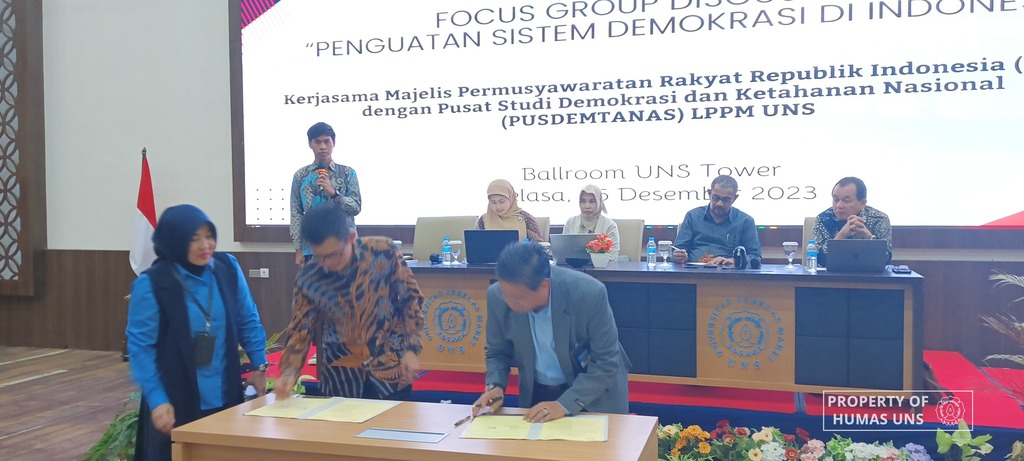UNS – The Center for the Study of Democracy and National Resilience (Pusdemtanas) at the Research and Community Service Institute (LPPM) of Universitas Sebelas Maret (UNS) Surakarta conducted a Focus Group Discussion (FGD) on Strengthening the Democratic System in Indonesia. The FGD was held in collaboration with the People’s Consultative Assembly (Majelis Permusyawaratan Rakyat, or MPR) of the Republic of Indonesia at the Ki Hadjar Dewantara UNS Tower on Tuesday (5/12/2023).
Several speakers participated in the FGD, including Political, Legal, and Security Activist Dr. Nicholay Aprilindo, S.H., M.M.; the Head of the Study and Community Aspiration Management Section of MPR RI, Susan Andriyani, S.E., M.H.; Professor of Sociology and Community FH UNS, Prof. Dr. Mohammad Jamin, S.H., M.Hum; and Political Science Expert at UNS, Erna Yuliandari, S.H., M.A.
The Head of Pusdemtanas LPPM UNS, Prof. Dr. Sunny Ummul Firdaus, S.H., M.H., conveyed that the existence of Pancasila democracy in the life of the Indonesian nation plays a crucial role in ensuring the equality of citizens in national life. It guarantees the enforcement of laws based on Pancasila values and ensures harmonious relations between state institutions.
“The meaning of democracy as the basis for living in society and the state implies that the people determine matters concerning their lives, including assessing state policies, as these policies will determine the lives of the people,” Prof. Sunny said in his opening remarks.
The emergence of the concept of democracy stems from the fact that the direct application of democracy is no longer relevant. This is due to the increasing population and the complexity of state affairs, making it impossible for the people to make policies directly.

The term democracy, especially in various developing countries, has become increasingly popular both in discourse and on socio-political levels. As a political system, democracy has occupied the top stratum and is accepted by many countries because it is considered capable of regulating and resolving social and political relationships, involving individual interests in society, relationships between communities, communities and the state, and international relations.
Issues marking the decline of democracy in Indonesia in terms of structure and institutional aspects include money politics in elections, political corruption, low-quality elections, low government effectiveness, low political participation, and discrimination against minorities.
The dynamics of organizing community life and statehood will undoubtedly influence the implementation of democracy in Indonesia. This is what needs to be optimized and strengthened to ensure the implementation of democratic life in accordance with regulations, standards, and the dignity of the state. Specifically, the impact of the implementation of democracy will be carried out, accepted, and provided to the community or citizens to reduce issues in the implementation of democracy in Indonesia.
The UNS Rector, Prof. Dr. Jamal Wiwoho, S.H., M.Hum., who attended the event, welcomed the holding of the FGD on Strengthening the Democratic System in Indonesia. In fact, during the event, the UNS Rector also signed a cooperation agreement between UNS and MPR RI. “On behalf of the leadership, I am very pleased. Because not only an FGD is conducted but also the signing of cooperation with MPR RI,” Prof. Jamal said.
Prof. Jamal urged that this signing of cooperation is not just on paper. He hopes that collaborations will emerge between UNS and MPR RI. HUMAS UNS
Editor: Dwi Hastuti
Comments (0)